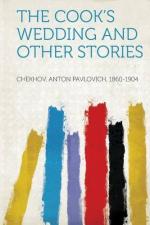A flash of lightning, some fourteen feet long, gleams above their heads. There is a loud peal of thunder, and it seems to Fyokla that something big, heavy, and round is rolling over the sky and tearing it open, exactly over her head.
“Holy, holy, holy . . .” says Terenty, crossing himself. “Don’t be afraid, little orphan! It is not from spite that it thunders.”
Terenty’s and Fyokla’s feet are covered with lumps of heavy, wet clay. It is slippery and difficult to walk, but Terenty strides on more and more rapidly. The weak little beggar-girl is breathless and ready to drop.
But at last they go into the count’s copse. The washed trees, stirred by a gust of wind, drop a perfect waterfall upon them. Terenty stumbles over stumps and begins to slacken his pace.
“Whereabouts is Danilka?” he asks. “Lead me to him.”
Fyokla leads him into a thicket, and, after going a quarter of a mile, points to Danilka. Her brother, a little fellow of eight, with hair as red as ochre and a pale sickly face, stands leaning against a tree, and, with his head on one side, looking sideways at the sky. In one hand he holds his shabby old cap, the other is hidden in an old lime tree. The boy is gazing at the stormy sky, and apparently not thinking of his trouble. Hearing footsteps and seeing the cobbler he gives a sickly smile and says:
“A terrible lot of thunder, Terenty. . . . I’ve never heard so much thunder in all my life.”
“And where is your hand?”
“In the hole. . . . Pull it out, please, Terenty!”
The wood had broken at the edge of the hole and jammed Danilka’s hand: he could push it farther in, but could not pull it out. Terenty snaps off the broken piece, and the boy’s hand, red and crushed, is released.
“It’s terrible how it’s thundering,” the boy says again, rubbing his hand. “What makes it thunder, Terenty?”
“One cloud runs against the other,” answers the cobbler. The party come out of the copse, and walk along the edge of it towards the darkened road. The thunder gradually abates, and its rumbling is heard far away beyond the village.
“The ducks flew by here the other day, Terenty,” says Danilka, still rubbing his hand. “They must be nesting in the Gniliya Zaimishtcha marshes. . . . Fyolka, would you like me to show you a nightingale’s nest?”
“Don’t touch it, you might disturb them,” says Terenty, wringing the water out of his cap. “The nightingale is a singing-bird, without sin. He has had a voice given him in his throat, to praise God and gladden the heart of man. It’s a sin to disturb him.”
“What about the sparrow?”
“The sparrow doesn’t matter, he’s a bad, spiteful bird. He is like a pickpocket in his ways. He doesn’t like man to be happy. When Christ was crucified it was the sparrow brought nails to the Jews, and called ‘alive! alive!’”
A bright patch of blue appears in the sky.




